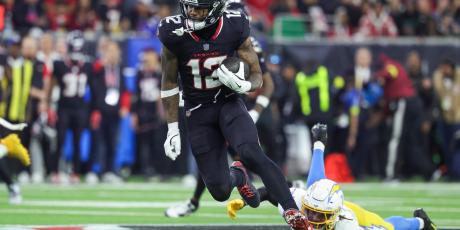Why Game Script Matters for Quarterbacks in Fantasy Football

Unlike running backs in real football or quarterbacks in fake football, game script matters.
We've all been there: slouched before the TV on Sunday afternoon, seeing our quarterback's team go down by three scores in the first half, salivating at the prospect of more dropbacks, more passes, more potential for putting up fantasy points. The terrible truth—as you realize when your quarterback has tossed his third pick in all-out comeback mode—is that this isn't the way it works for most signal-callers. Quarterbacks thrive with positive game script, while faltering with game script's ugly flip side.
Not even the elite of the elite can escape the impact of negative game script. Tom Brady over the past decade has averaged eight fewer fantasy points in Patriot losses. Since 2012, Aaron Rodgers has notched 6.5 fewer fantasy points in Green Bay losses. Drew Brees in the past five seasons has scored 5.5 fewer points when the Saints lose. No one (except Russell Wilson, for the most part) can avoid the hellishness of bad game script.
I ran the numbers on how quarterbacks fare with and without game script on their side. Below are four signal-callers being drafted as fantasy starters, and one who I believe will be in that group by the time August drafts are underway. This sort of analysis is actionable when these quarterbacks enter a game in which they face obviously good or bad game script. Perhaps they go into a week as heavy road underdogs, with injuries to key offensive players. That, roughly speaking, would qualify as a potentially nasty script. Maybe they face off against a sieve of an injury-plagued defense, with their team on the right side of the Vegas spread. This would tip us off to positive script, or something resembling it.
Matthew Stafford (DET)
The Lions' sidearm slinger sports a hefty 7.2-point gap in Detroit wins and losses over his career. Zoom in on Stafford's time in Jim Bob Cooter's offensive system and the numbers are still on the hideous side: he's averaged 25.8 fantasy points in Detroit wins since Cooter took charge, and 18.7 points in losses.
Stafford under Cooter has attempted five more passes in Detroit losses (this is a running theme among these quarterbacks: way more attempts and decreased efficiency) along with 1.5 yards per attempt less. Stafford's interception rate triples in Lions losses.
This isn't your grandparents' Stafford, who, in the prime of his connection with Calvin Johnson, padded his fantasy numbers by collecting obscene yardage in Detroit losses. In 2011-12, Stafford posted 314.4 yards per game in Lions losses, thanks largely to an eye emoji-inducing 47 attempts in those games. He managed 22 fantasy points in losses during that stretch; in Cooter's system, that's plunged to 18.5.
Stafford's massive gap is hardly shocking. When game script turns and everyone in the stadium knows the pocket QB will be forced to drop back time and time again, conditions become decidedly unfavorable for said statuesque passer. Stafford's no exception.
Jared Goff (LAR)
Goff, the ninth quarterback off the board as of this writing, is a lock to be the most over-drafted quarterback in fantasy football this year. That 5.9 percent touchdown rate from 2017 won't hold, Brandin Cooks or no Brandin Cooks.
I threw out Goff's rookie campaign because, well, it's not at all instructive. He's been extracted from the Jeff Fisher Nightmare Machine; we must account for that. Goff's win/loss splits in 2017 were, in a word, horrific. He notched 14.9 points in Rams losses—about 10 points less than in Rams victories. The difference comes down to touchdown production, more so than any other QB in this analysis. Goff tossed 2.27 touchdowns in Rams wins. And he isn't one to pile up the empty yards in Rams losses, as last season he averaged 22 fewer yards when the Rams took the L, despite more pass attempts in those contests.
He managed 0.75 touchdown passes in Rams losses. He cracked double-digit fantasy points just once in four Rams losses in 2017, while scoring less than 16 points only once when the Rams won.
The good news for Goff truthers is that Vegas has the Rams pegged for 9.5 wins. Only four teams have a higher win over/under for 2018.
Kirk Cousins (MIN)
The bad news for Cousins: he had a 6.3-point gap in wins and losses as Washington's starter. The good news: the Vikings probably won't suck as much as Washington did during Cousins' tortured tenure.
Cousins was a meaningless yardage machine in Washington, piling up an average of 294 yards in losses—28 more yards than he posted in wins. His touchdown production dipped a bit in losses, but he still managed 1.35 touchdown tosses when Washington lost. The 2017 season featured four Washington losses in which Cousins posted more than 20 fantasy points.
It seems unlikely Cousins will be afforded the same opportunity for total garbage fantasy production as Minnesota's starter, though that might not matter since the Vikings have one of the highest win/loss over/unders in the league (9.5). Cousins has been lights out in victories, averaging 1.95 touchdowns since 2016, and posting multi-touchdown performances in six of Washington's seven wins. He did the same in six-of-eight 2016 Washington wins.
Cousins' steep production drop in losses will only be a factor if the Vikings' 2018 season goes off the rails.
Cam Newton (CAR)
Rushing production doesn't seem to do much to blunt the effects of negative game script, as we see with Newton, who notches 5.8 fewer fantasy points in losses. The gap is starker when we focus on the past three seasons: Newton has scored almost eight fewer fantasy points in Carolina losses over that stretch. That's a lot, as we say in the industry.
Newton, always among the NFL's least accurate passers, has thrown a whopping 1.53 picks per game in losses over that span. He managed to complete a meager 56 percent of his passes in 2017 losses, which somehow marks an improvement over his 53 percent completion rate in 2016 losses. The short of it: when script turns sour for the Panthers and the offense becomes one dimensional, Newton's otherworldly fantasy production takes a nosedive. This might have something to do with a reliably inaccurate passer being forced into a predictable offensive attack as his team chases points.
Newton's ground production remains mostly stable in wins and losses. It's his passing numbers that could (should) give us pause if and when the Panthers head into a game that appears blatantly unfavorable.
Marcus Mariota (TEN)
Mariota, unlike the others in this piece, isn't being drafted as a fantasy starter, likely because he stung so many fantasy footballers in 2017 with a never-ending string of lackluster performances.
Mariota's hype train will get a refueling from details of a new offensive system in Tennessee—one that could turn Mariota into the fantasy deity his truthers believe him to be. His win/loss splits shouldn't be ignored though: Mariota over this first three pro seasons has averaged 6.5 fewer fantasy points in Titans losses. His interception rate doubles in losses and he averages less than a touchdown pass per game. That's abysmal.
Amid a spike in dropbacks and pass attempts, Mariota's rushing attempts see a marked drop in Tennessee losses. Last season he averaged a hearty 4.5 runs per game in wins, and 3.2 rushes in losses. He logged 4.8 rush attempts in 2016 wins and 3.3 rushes in losses. The Titans, for the record, have an over/under of 7.5 wins in 2018.
I'm not sure anyone can say with confidence that Mariota's rushing usage will alter in the team's new offense; I think it's presumptuous to think it will. Wherever you stand on his 2018 prospects, remember that Mariota has been hardly serviceable in losses. This is the guy who threw for three—THREE—touchdowns in six 2017 Titans losses. He averaged 222.2 passing yards in those contests. Not great, Bob.
Photo by Gregory Shamus/Getty Images.
Related Articles






















